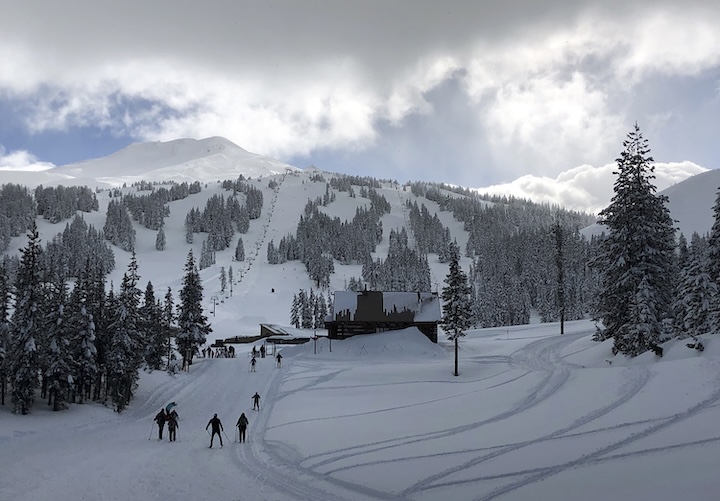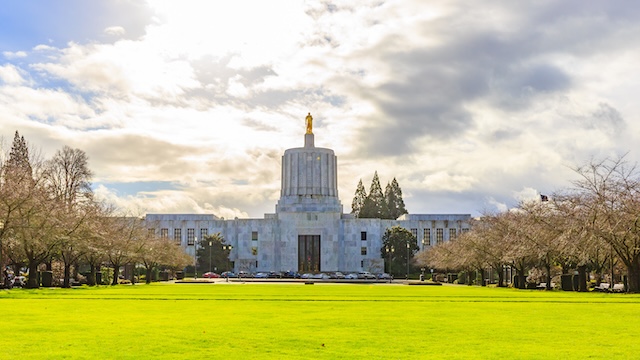Editorial: What liability should ski areas have when there is an accident?
Published 8:56 am Wednesday, June 18, 2025

- Snow riders head up to a lift at Mt. Bachelor ski area in 2019. (AP Photo/Andrew Selsky)
Other than snowfall, the Oregon Legislature might be what dictates the kind of season skiers and boarders enjoy next year.
Oregon is down to one major insurer for ski areas. That monopoly could inflate premiums. That could be bad for snow riders. Ski areas may raise their lift ticket prices to compensate. Recreational businesses — including snowsports, river rafting, biking and horseback riding — argue Oregon’s insurance environment is increasing their costs and making it difficult to do business.
Legislators presented two visions of a solution on Monday.
Trending
The state of Oregon could get involved directly in the insurance business. If recreational businesses, such as ski areas, rafting companies and the like are having trouble getting insurance, the state government could create an entity to make up for the failure of the market to provide reasonable insurance. For instance, it could create a nonprofit entity like SAIF. SAIF is the state’s not-for-profit workers’ compensation insurance company.
The second approach would be to change the law so private insurers might be more inclined to offer insurance in Oregon. In other states, ski areas and other recreational businesses can ask their clients to sign waivers that can limit the liability of the business for accidents. Oregon law doesn’t support that.
The two views clashed on Monday.
“The state of Colorado and other states around us have a strict enforceability of waivers,” state Sen. Mark Meek, D-Oregon City, said. “Oregon does not. Why are we not trying to address why Oregon does or does not honor waiver liability?”
“The reality is if operators use due diligence, take care of their equipment, … they more than likely are not getting sued,” replied state Sen. Floyd Prozanski, D-Eugene and Springfield. “I do a lot of whitewater rafting and other outdoor activities. I know when I am doing that I am in an area that has more risk that I am accepting. At the same time, I don’t expect the operators to have a waiver to say that I cannot bring a simple, ordinary negligence claim against them if they were negligent with what they are doing and providing.”
The clash was a friendly policy disagreement. Still, there was tension.
Trending
Earlier this year, recreational businesses and their supporters backed legislation that would have changed the law. House Bill 3140 would have allowed “recreational operators to require liability waivers for people 18 years or older releasing them from claims of ordinary negligence relating to sports, fitness, or recreational activity.” The bill wouldn’t mean recreational operators would be immune to lawsuits. It would grant them an extra layer of government-sanctioned protection from lawsuits involving ordinary negligence.
Ordinary negligence is when a reasonable person does not exercise reasonable care. It could be when a ski area employee forgot to put up a sign alerting mountain riders that an area is dangerous. The employee may never have meant to cause harm. If a person was injured, a lawsuit could make the ski area liable for damages.
A more extreme form of negligence is called gross negligence. It is more severe and reckless behavior. It could be if the ski area’s management knew that the employee supposed to put up such a sign was repeatedly drunk at work and the employer didn’t do anything about the behavior.
The bill stalled.
State Rep. Jason Kropf, D-Bend, formed a working group to look for a solution. The idea was: If getting reasonable insurance was the problem, maybe the state should step in and provide insurance. Prozanski argued Oregon should not carve out an exception in the law to extend a liability shield for some types of Oregon businesses.
“The reality is what they really need to do is to make sure they do due diligence and make certain that their facilities are up to standard and do not pose a negligence risk to the users of those properties,” he said.
With the liability protection bill stalled in the House, Meek’s Senate Bill 1196 is proposed to be completely rewritten to become House Bill 3140, version 2.0.
It was clear Monday Prozanski did not appreciate the end around. Meek pushed back saying businesses don’t think the only problem is the absence of insurance.
This fight may not be resolved this session. It’s been a question that lawmakers have returned to again and again since 2014 when an Oregon Supreme Court case involving a terrible incident at Mt. Bachelor ski area opened up the question: What injury liability should recreation businesses have?
Tell your legislator what you think.








